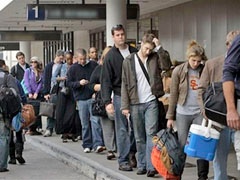Mailroom screening is an important part of keeping your critical infrastructure facility secure. As an essential part of the community, you cannot afford to have any disruptions to your day to day operations.
Whether you are a bank, correctional facility, school, or courthouse, your mailroom is responsible for processing incoming and outgoing mail. Ensuring operations around this are kept safe is imperative. With a proactive approach, you’ll be prepared to protect your facility, staff, and assets in case of an attack.
Read More
Topics:
General Security,
Critical Infrastructure,
Security Threats,
Current Events
As specific airports facing the large PEDs ban implement stricter security controls, governments have been lifting restrictions on a case by case basis. The personal electronic device (PED) ban prohibits passengers from carrying large electronics such as tablets, eReaders, and laptops aboard certain aircrafts flying direct from one airport to another.
The main concern centers on select airports with insufficient security measures in place to prevent a new type of threat from entering secure areas. Threat PEDs cleverly use everyday consumer electronics to conceal improvised explosive devices (IEDs). The resulting product is items such as laptop bombs. Airports worldwide must reevaluate current security controls and if necessary, implement additional measures to effectively intercept threat PEDs at the checkpoint.
Read More
Topics:
Security Training,
Aviation Security,
Security Threats,
Current Events
Suicide bombings can occur anywhere. When we hear about them, they typically occur in North African countries or the Middle East region. One of the latest attacks occurred in Kabul, Afghanistan on the morning of May 31 in the city’s diplomatic quarters, killing at least 90 people and injuring more than 400.
At times, they occur in Asian or Western regions such as the attack in Manchester, UK which occurred shortly after a concert concluded on May 22, killing 22 and injuring dozens. In another incident just two days later, a pair of suicide bombers killed three police officers outside a bus terminal in Jakarta, Indonesia.
No one can tell where and when a suicide bomber will strike. That’s why incidents like these are such a shock and difficult to cope with. It does not matter where in the world you are, it’s clear that the threat of the suicide bomber has grown greater and become more widespread.
Read More
Topics:
Trends,
General Security,
Critical Infrastructure,
Security Threats,
Current Events
For years terrorists have called on followers, affiliates, and sympathizers to use any means necessary to harm those who do not follow their ideals. For those who are unable to build their own bombs or acquire the necessary weapons to carry out attacks, the use of vehicles has been recommended to cause damage and harm people.
We’ve seen it time and time again. Terrorists and lone wolfs drive trucks, lorries, and other vehicles through large crowds, injuring and killing the defenseless. It’s an ugly terrorism tactic that has gained momentum in the past few years. Even in just the last few months, we’ve witnessed a handful of these vehicle attacks worldwide. Let’s look back at the most recent incidents and discuss this new terrorism trend of using vehicles as a weapon.
Read More
Topics:
Trends,
General Security,
Critical Infrastructure,
Security Threats,
Current Events
On the morning of Tuesday 21 March, the United States announced an electronics ban on inbound direct flights from certain Middle East and North African countries and required nine airlines to comply within 96 hours. The United Kingdom released similar restrictions later that day affecting 14 airlines.
Both bans order airlines to prohibit passengers from bringing large electronics into the cabin of the aircraft, but to instead place them into checked baggage. Although there is no direct threat or plot authorities are aware of, US officials say it’s a move in response to terrorist organizations working to perfect techniques for hiding explosives in electronic devices. Let’s take a closer look into the aviation threat causing governments to implement bans.
Read More
Topics:
Aviation Security,
Cargo Security,
Security Threats,
Transportation,
Current Events
By the end of 2016, over 3.7 billion passengers will travel this year. According to the International Air Transport Association (IATA), forecasts for 2035 will nearly double at 7.2 billion air passengers travelling in a single year.
The biggest driver of air travel demand is expected to be the Asia-Pacific region whereby more than half of aviation’s new passengers will come from over the next 20 years. A key concern for the aviation industry is that the region’s current infrastructure will not be able to keep pace with the forecasted passenger growth. In fact, some runways and airport terminals in the region are approaching capacity limits or already over capacity. Any plans for building new airport infrastructures must happen soon.
Read More
Topics:
Trends,
Critical Infrastructure,
Transportation,
Current Events
The recent safety recall of the Samsung Galaxy Note7 smartphone is causing a stir within the aviation industry. Dozens of consumers have reported these devices catch fire while charging. These incidents have been attributed to faulty lithium ion batteries. As a result, many airlines and aviation organizations have banned their use aboard airplanes.
This restriction comes as no surprise since earlier this year, International Civil Aviation Organization (ICAO) put into effect new regulations concerning this dangerous good. The temporary aviation ban prohibits all cargo shipments of lithium ion batteries from flying on passenger aircrafts. The risk of an aircraft fire is too significant given that lithium batteries contain very high levels of energy and current in-flight suppression systems are not strong enough to put out these types of fires.
Read More
Topics:
Aviation Security,
Transportation,
Current Events
The United Kingdom's vote to leave the European Union, popularly known as Brexit (British Exit), was decided on June 23rd 2016. More than 33 million people came out to vote on the referendum with 51.9% voting in favor of the change.
The UK now needs to notify the EU of its intention to formally leave by filing under Article 50 of the Lisbon Treaty. Finalization of this separation could take up to 2 years or more. How will Brexit impact the aviation industry in the short and long run?
Read More
Topics:
Trends,
Transportation,
Current Events
Security screener shortages and increased passenger volume at the airport - doesn’t make for a good combination, does it. Unfortunately, that’s exactly what the US Transportation Security Administration (TSA) is facing at the moment.
The recovering economy and low price of airfare has boosted the volume of passengers flowing through airports. This uptick is wreaking havoc on the busiest US airports including Atlanta, Chicago, Dallas, and New York since passengers are unable to get through security fast enough. The strain is being felt on everyone including passengers, airports, and airlines.
Read More
Topics:
Aviation Security,
Transportation,
Current Events
Brussels was rocked by terrorism this week. On the morning of Tuesday, March 22nd, two explosions hit inside Zaventem international airport and a third just a few miles away at Maelbeek metro station. The attacks have tragically left at least 30 people dead and hundreds wounded. These attacks come days after Paris terror suspect Salah Abdeslam was captured in the suburb of Molenbeek by Belgian authorities. It is believed the two incidents are related.
Read More
Topics:
Aviation Security,
Critical Infrastructure,
Security Threats,
Transportation,
Current Events










